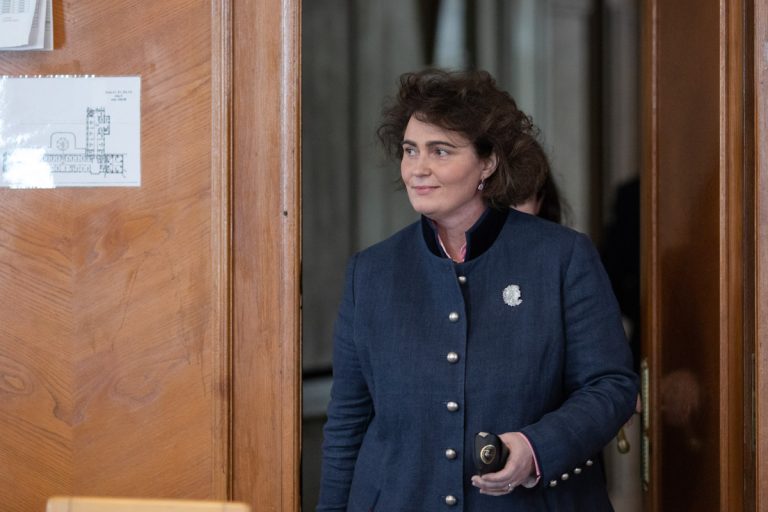
Harsh dissenting opinion from Judge Iulia Scîntei on the CCR decision in the Șoșoacă case: the Constitutional Court legislated beyond its competence / Sanctioning limits on freedom of expression falls to other state institutions
Constitutional Court Judge Iulia Scîntei sharply rejected the majority opinion within the Constitutional Court of Romania (CCR), which on Saturday upheld a challenge to Diana Șoșoacă’s presidential candidacy. In her dissent, Scîntei argues that the CCR has assumed new powers not outlined in the Constitution or in law, imposed new “subjective” criteria for presidential candidacy and failed to ensure the right to defense as guaranteed by the European Court of Human Rights.
Urmărește cele mai noi producții video G4Media
- articolul continuă mai jos -
To recap, the five CCR judges who supported the challenge argue in their decision that a presidential candidate must pledge to uphold the presidential oath before even being elected to office.
The five CCR judges are Marian Enache, Bogdan Licu, Cristian Deliorga, Giani Stan, and Attila Varga.
Here are the most important points from Judge Scîntei’s dissenting opinion:
“The electoral dispute regarding presidential elections is objective and abstract and does not pertain to behaviors, speeches, political qualifications, or campaign acts typical of a subjective, concrete electoral dispute. The Court’s duty under Article 31 of Law No. 370/2004 is solely to verify the constitutionality of legal procedures and the legality of formal and substantive conditions expressly set out in the Constitution and Law No. 370/2004.
The Court’s role is to verify the fulfillment of objective legal conditions (such as compliance with deadlines for submitting candidacies, the minimum number of supporting signatures, accompanying documentation, and any disqualifications strictly outlined by the Constitution and law). These conditions, by their nature, do not concern the behavior, opinions, statements, or attitudes of a candidate for the presidency of Romania. Such subjective aspects fall within the freedom of expression for all candidates. Punishing violations of the limits of freedom of expression is to be handled by other state institutions through a legal process, and is not a function assigned to the Constitutional Court in overseeing the presidential election procedure.
In our opinion, and contrary to the Court’s entire jurisprudence on presidential election disputes, the majority ruling in Cases No. 3043F/2024 and No. 3045F/2024 is based on none of these objective formal and substantive conditions explicitly outlined by the Constitution and organic law. No constitutional or legal provision permits the Constitutional Court, through the interpretation of its own competence (which is expressly and restrictively outlined in the Constitution and law), to expand or supplement its jurisdiction with two new conditions for candidacies. These conditions, being clearly subjective in nature, pertain to a person’s behavior, opinions, and statements and are not stipulated in either the Constitution, Law No. 370/2004, or Law No. 47/1992.
The new substantive requirements deemed necessary in the majority’s opinion for candidates running in or after 2024 are derived from the “sacred formula of the oath taken by the elected President of Romania,” specifically the duty to respect the Constitution and uphold democracy, reflecting a candidate’s “commitment to constitutional values.” The majority’s decision imposes, unambiguously and as a binding precedent, that these two obligations become essential criteria for candidacies, even though they are not explicitly outlined in the Constitution or Law No. 370/2004. Consequently, these criteria would need to be verified before a candidacy is registered for the presidential elections. By interpreting its own competence in this way, the majority ruling effectively amends Law No. 370/2004 to add new substantive conditions for candidacies, assigning the Central Electoral Bureau the task of verifying compliance with these conditions prior to registration. However, Law No. 370/2004 limits the Bureau’s authority to verifying only the substantive and formal conditions provided in this law for candidacies [art. 29 para.(1)].
In reality, by interpreting its constitutional mandate under Article 146 (f) to legislate beyond the Constitutional Court’s jurisdiction, the majority decision establishes two new eligibility requirements, treating them as implicit substantive conditions verified by the Court in the challenge proceedings of Case No. 3043F/2024, which goes beyond the law.
According to the constitutional and legal framework, including Court jurisprudence, electoral rights may only be restricted in cases explicitly and narrowly defined by the Constitution (Article 37 in conjunction with Article 16(3) and Article 40(3)) and by law. Article 28 of Law No. 370/2004 establishes specific prohibitions on presidential candidacies for individuals who, at the time of their candidacy, do not meet the requirements of Article 37 of the Romanian Constitution, have previously served two terms as President of Romania, or have been definitively convicted of intentional criminal offenses without subsequent rehabilitation, pardon, or decriminalization. Additionally, the ban on exercising one or more electoral rights (such as the right to run for public office or vote) for one to five years is set as an additional penalty under Article 66(1)(a) and (d) of the Criminal Code.
The majority decision has effectively converted the objective electoral dispute defined by law into a subjective electoral dispute by assuming the role of evaluating a candidate’s behavior, actions, and statements. This shift was not accompanied by the guarantees of a fair trial: ensuring adversarial proceedings, guaranteeing the right to defense for the individual whose constitutionality is being questioned, and providing a procedure for presenting and contesting evidence and resolutions.”

Donează lunar pentru susținerea proiectului G4Media
Donează suma dorită pentru susținerea proiectului G4Media
CONT LEI: RO89RZBR0000060019874867
Deschis la Raiffeisen Bank



